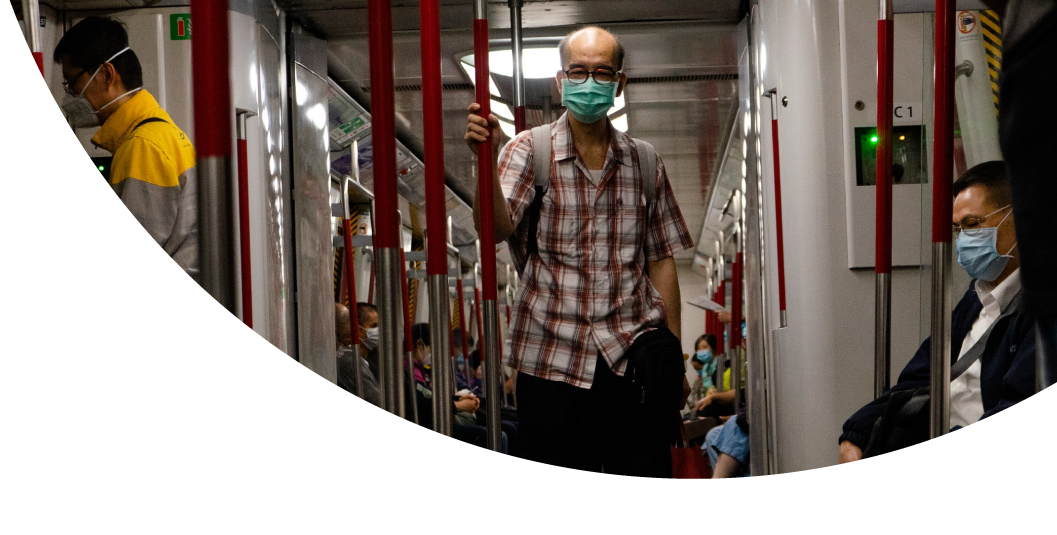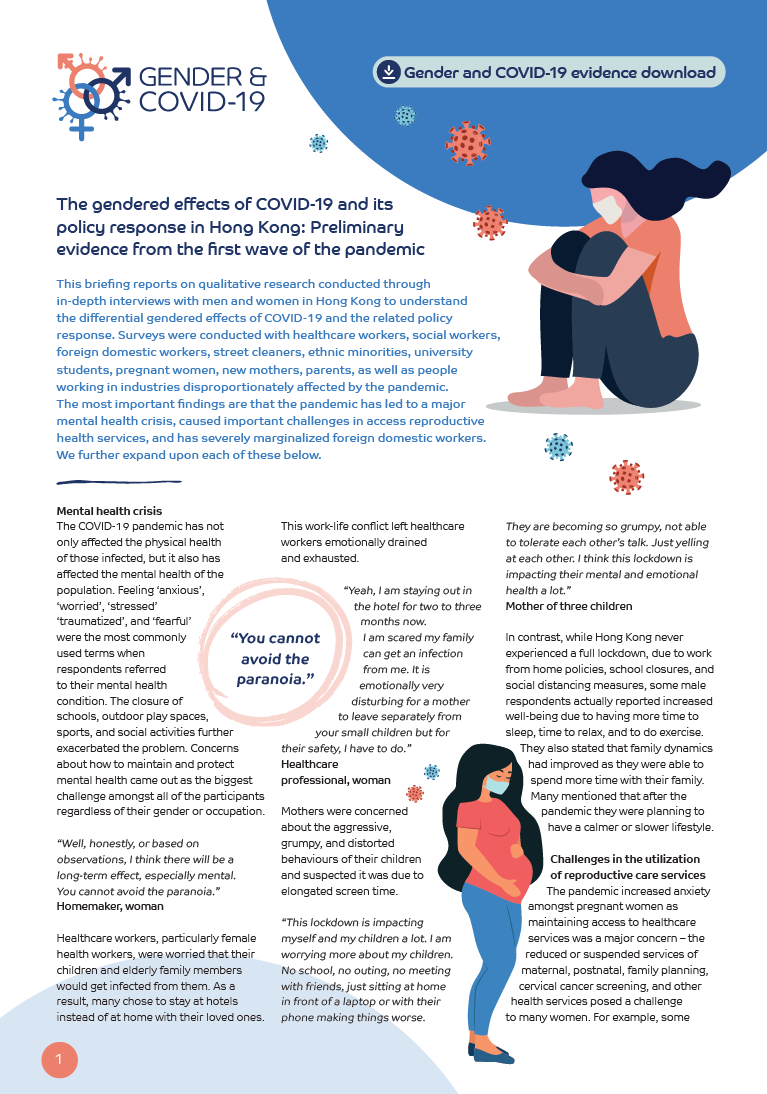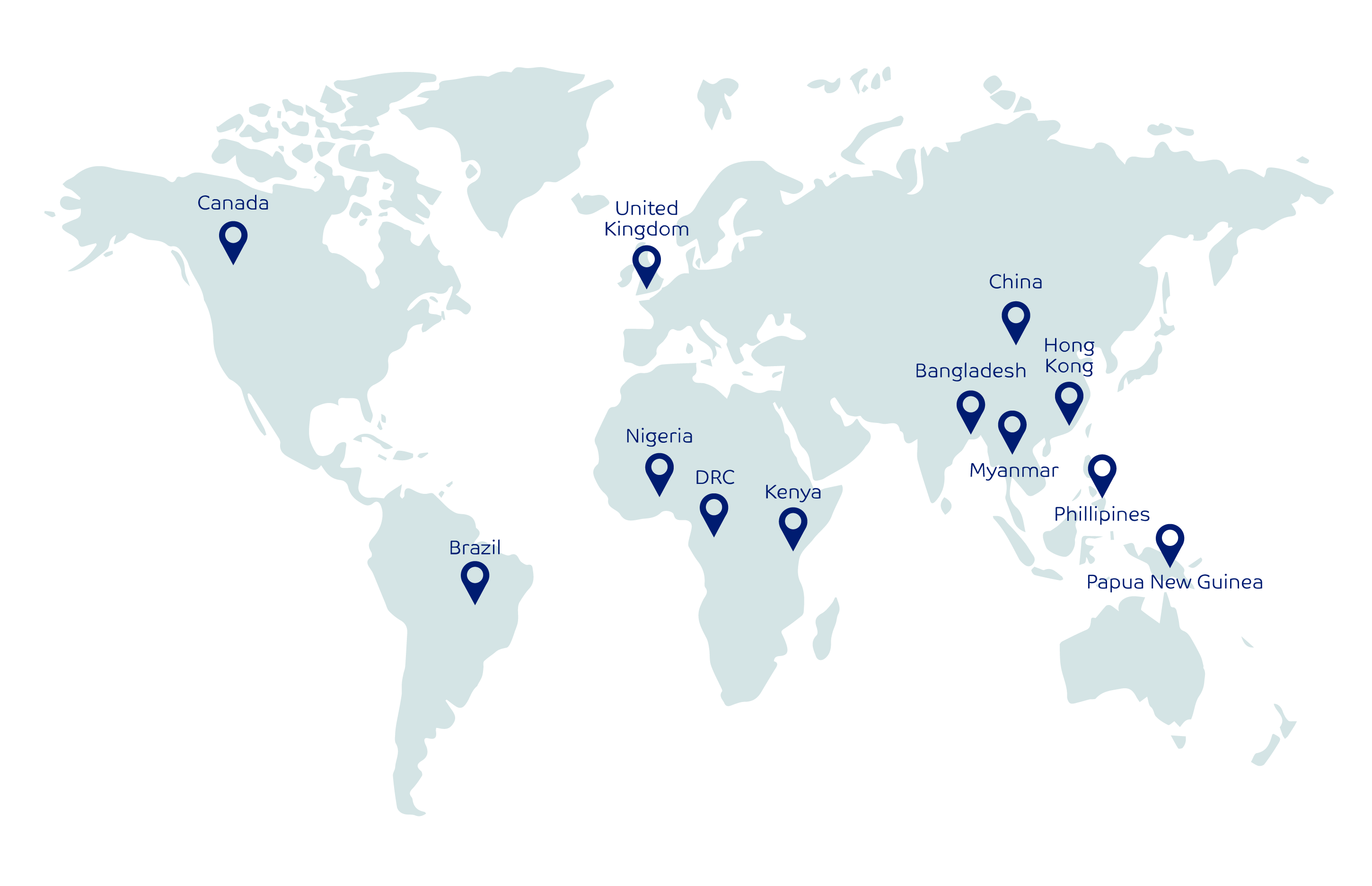Hong Kong
Hong Kong is a Special Administrative Region of China, which at the outset of the outbreak of COVID-19 in mainland China faced a very high risk of a large-scale epidemic within its borders. However, with the memory of severe acute respiratory syndrome (SARS) in 2003 still vivid in people’s mind, the Hong Kong government quickly mobilized resources to contain transmission of COVID-19 and Hong Kong community responded and complied with anti-epidemic measures proactively. All but two border crossings with mainland China, the Hong Kong International Airport, and the Kai Tak Cruise Terminal were closed in early February, which has had profound economic and social consequences for the Region.
Inbound tourism is effectively at a standstill, which had already been negatively affected by socio-political unrest in the preceding year. The retail, tourism, airline, and hospitality industries have been severely affected and as the majority of workers are women, they have to bear the brunt of job losses and unpaid leave. To tackle the economic downturn, the Hong Kong government approved HK$137.5 billion (US$17.7 billion) public funds to implement an “Anti-pandemic Fund”, of which HK$81 billion (US$ 10.4 billion) was allocated to provide time-limited financial support to employers in order to retain employees who may otherwise be made redundant. However, the General Secretary of the Retail, Commerce and Clothing Industries General Union (RCCIGU) has expressed dissatisfaction towards the government’s policy by pointing out that it has many loopholes which only benefits the companies and not directly to the workers.
Like many other parts of the world, women in Hong Kong also had to bear a disproportionate burden of the increased caregiving and household chores that resulted from the school closure and work from home policies that were implemented in the city towards the end of January 2020. Families were forced to cope with working from home and coordinating home learning, which was significantly challenging for many given the small size of apartments in Hong Kong. Gender roles for men and women in Hong Kong are deeply ingrained such that husbands are not ready to share household chores with their wives, resulting in increased stress and work for women. The problem was even worse for single parents families, the majority of which (77%) are headed by women. The closure of day care centres, kindergartens and schools left these women with no place to leave their child when they have to go out for work, shopping or run other errands.
The pandemic also left over 400,000 foreign domestic workers vulnerable, almost all of whom are women. According to law, foreign domestic helpers must live-in with their employers. With employers working from home, many of the domestic workers found themselves with no privacy, overwork and 24×7 scrutiny during the pandemic. In addition to their regular duties, they also had to bear the additional burden of cleaning and sanitizing the house and toilet multiple times a day irritating their hands and eyes due to excessive use of cleaning agents, alcohol, and bleach. A recent survey found that around 50,000 helpers did not have access to personal protective equipment and highlighted the ‘irresponsible’ behaviour of employers by failing to provide them masks and sanitizers. Social distancing measures also created havoc in the lives of domestic workers. Many employers did not allow them to leave the apartments on Sundays, which is their legally mandated rest day. The employers often justified this action for fear of their helpers bringing the infection home, however, at the same time, helpers reported that their employers were still leaving the apartment. This not only put the domestic workers’ health at risk but also raised the feeling of being discriminated. After reports of cases of COVID-19 amongst domestic workers, some employers fired their domestic workers suspecting them as carrier of infection.
Posts on Hong Kong

Hong Kong
Hong Kong is a Special Administrative Region of China, which at the outset of the outbreak of COVID-19 in mainland China faced a very high risk of a large-scale epidemic within its borders. However, with the memory of severe acute respiratory syndrome (SARS) in 2003 still vivid in people’s mind, the Hong Kong government quickly mobilized resources to contain transmission of COVID-19 and Hong Kong community responded and complied with anti-epidemic measures proactively. All but two border crossings with mainland China, the Hong Kong International Airport, and the Kai Tak Cruise Terminal were closed in early February, which has had profound economic and social consequences for the Region.
Inbound tourism is effectively at a standstill, which had already been negatively affected by socio-political unrest in the preceding year. The retail, tourism, airline, and hospitality industries have been severely affected and as the majority of workers are women, they have to bear the brunt of job losses and unpaid leave. To tackle the economic downturn, the Hong Kong government approved HK$137.5 billion (US$17.7 billion) public funds to implement an “Anti-pandemic Fund”, of which HK$81 billion (US$ 10.4 billion) was allocated to provide time-limited financial support to employers in order to retain employees who may otherwise be made redundant. However, the General Secretary of the Retail, Commerce and Clothing Industries General Union (RCCIGU) has expressed dissatisfaction towards the government’s policy by pointing out that it has many loopholes which only benefits the companies and not directly to the workers.
Like many other parts of the world, women in Hong Kong also had to bear a disproportionate burden of the increased caregiving and household chores that resulted from the school closure and work from home policies that were implemented in the city towards the end of January 2020. Families were forced to cope with working from home and coordinating home learning, which was significantly challenging for many given the small size of apartments in Hong Kong. Gender roles for men and women in Hong Kong are deeply ingrained such that husbands are not ready to share household chores with their wives, resulting in increased stress and work for women. The problem was even worse for single parents families, the majority of which (77%) are headed by women. The closure of day care centres, kindergartens and schools left these women with no place to leave their child when they have to go out for work, shopping or run other errands.
The pandemic also left over 400,000 foreign domestic workers vulnerable, almost all of whom are women. According to law, foreign domestic helpers must live-in with their employers. With employers working from home, many of the domestic workers found themselves with no privacy, overwork and 24×7 scrutiny during the pandemic. In addition to their regular duties, they also had to bear the additional burden of cleaning and sanitizing the house and toilet multiple times a day irritating their hands and eyes due to excessive use of cleaning agents, alcohol, and bleach. A recent survey found that around 50,000 helpers did not have access to personal protective equipment and highlighted the ‘irresponsible’ behaviour of employers by failing to provide them masks and sanitizers. Social distancing measures also created havoc in the lives of domestic workers. Many employers did not allow them to leave the apartments on Sundays, which is their legally mandated rest day. The employers often justified this action for fear of their helpers bringing the infection home, however, at the same time, helpers reported that their employers were still leaving the apartment. This not only put the domestic workers’ health at risk but also raised the feeling of being discriminated. After reports of cases of COVID-19 amongst domestic workers, some employers fired their domestic workers suspecting them as carrier of infection.









